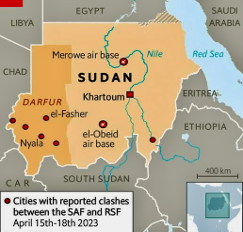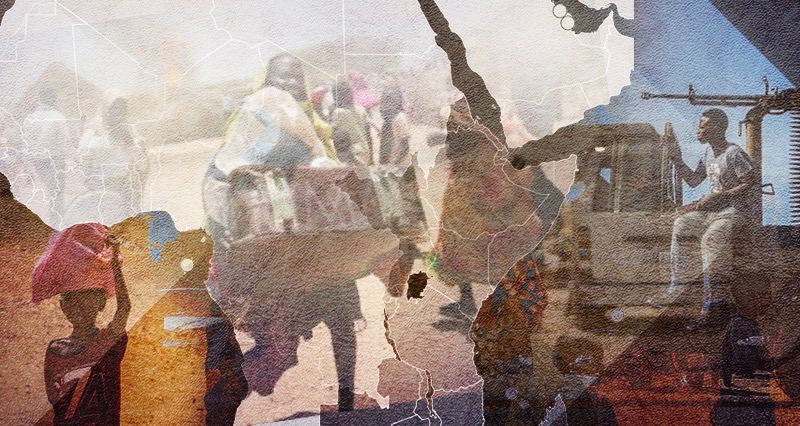Modern struggles, migration issues, geostrategic calculations and short-term approaches.
Modern struggles, migration issues, geostrategic calculations and short-term approaches.
The door that keeps letting in the draught, shut it, and be at peace.
(Sudanese Proverb)
Introduction
The ongoing conflict in Sudan has drawn significant international attention due to its humanitarian crisis and the broader implications for stability in East Africa. As Sudan grapples with internal strife, worsened by the military coup in 2021, the international community, particularly Western powers, has faced challenges in navigating a response. The political, social, and economic landscape of Sudan has been in a state of flux following the 2019 ousting of longtime dictator Omar al-Bashir and the subsequent transitional government. In 2023, the outbreak of violent conflict between the Sudanese military and paramilitary Rapid Support Forces (RSF) destabilized the nation, with humanitarian consequences that reverberate beyond Sudan’s borders. This article examines the current situation in Sudan, focusing on the political and humanitarian crises, and analyses the strategic responses of Western countries, particularly the U.S. and the EU, within the broader context of East African geopolitics.

Sudan, historically a nation caught between political instability and economic hardship, finds itself at a critical juncture following the 2021 coup that ousted a transitional government set to lead the country toward democracy. This event, alongside the subsequent escalation of violence, has placed Sudan in the spotlight, not only for its internal issues but also for the international community’s role in influencing the region’s future. The situation is further complicated by Sudan’s strategic position in the Horn of Africa, a region where geopolitical interests intersect.
Western countries, particularly the U.S., the EU, and the UK, have long been involved in East Africa, though their policies and approaches have been criticized for inconsistency and a lack of coherent long-term strategies. As Sudan’s crisis continues to deepen, the response of Western powers to the ongoing conflict will have significant implications for regional stability, migration flows, and broader geopolitical dynamics.
From ancient culture to modern struggles
Once upon a time, in the vast and vibrant lands of Sudan in the 19th century, the sun stretched its golden fingers across sweeping deserts, fertile plains, and majestic mountains. Life in Sudan was both harsh and beautiful. The camel caravans that crossed the desert brought goods from distant lands—spices, textiles, and even ideas from the far reaches of Africa, Arabia, and Europe. The Istanbul government oversaw the region to ensure safety and provide secure passage for the inhabitants. At the same time, the simple beauty of village life endured, where women wove intricate baskets, men labored in the fields, and children played beneath the vast, endless skies.
The Nile, with its deep connection to life and death, was a central part of the culture. It was here that people made their homes, cultivating crops, fishing its waters, and relying on its seasonal floods to nourish the land. In the bustling markets of Khartoum and the ancient city of Meroë, traders from all over Africa met to exchange goods and stories, while in the countryside, the rhythms of daily life continued unchanged. But as the 19th century drew to a close, Sudan, like many parts of Africa, began to face the challenges of colonialism. The British and Egyptians expanded their influence in the region, shaping the future of Sudan in ways that would unfold in the years to come.
Sudan gained independence from Egypt and Britain on January 1, 1956. This marked a new era in Sudanese history, but it was also the beginning of many political and social challenges. The conflict affected Sudan for much of the 21st century. Sudan experienced two lengthy civil wars: the First (1955-1972) and the Second (1983-2005).
One significant event in Sudan’s history was the Darfur conflict, which began in 2003. This resulted in widespread violence, displacement, and accusations of genocide by the Sudanese government. The Second Civil War led to the eventual secession of South Sudan in 2011, marking a major moment in Sudanese history. On April 11, 2019, Sudanese President Omar al-Bashir was ousted after months of protests against his 30-year rule. This led to a transition period, with a power-sharing agreement between the military and civilian groups. However, the situation has remained unstable, with political tensions continuing.
Sudan’s crisis today
The situation in Sudan is marked by political turmoil, armed conflict, and a dire humanitarian crisis. The military coup in October 2021, which derailed Sudan’s fragile transition to democracy, triggered mass protests and exacerbated tensions between the military and civilian factions. Despite efforts by international mediators, the situation has worsened, with fighting between Sudanese Armed Forces (SAF) and the Rapid Support Forces (RSF) leading to widespread displacement and destruction.
The violence has particularly affected urban centers, including Khartoum, where civilians have endured most of the fighting. The collapse of state institutions, widespread insecurity, and economic instability have triggered severe food insecurity, healthcare crises, and mass displacement. According to the United Nations, millions of Sudanese people are in need of humanitarian assistance, and the country has become a focal point for regional and international actors seeking to influence its future.
Western countries’ engagement with Sudan is influenced by a variety of factors, including regional stability, counterterrorism, humanitarian concerns, and economic interests. Historically, the U.S. has had a complex relationship with Sudan, shaped by the country’s past support for terrorist organizations, human rights violations, and the secession of South Sudan in 2011. However, after Sudan’s ousting of longtime autocrat Omar al-Bashir in 2019 and the formation of a civilian-led government, the U.S. moved to normalize relations with Sudan, removing the country from its list of state sponsors of terrorism.
For Western powers, Sudan’s strategic location in the Horn of Africa, a region that connects the Middle East with sub-Saharan Africa has made it a critical area of interest. The region has become increasingly important in the context of global competition, with growing Chinese and Russian influence and Western efforts to counter these powers’ expanding footprint. Sudan’s proximity to the Red Sea, a key maritime trade route, also makes it vital to global trade and security.
The United States has placed heavy emphasis on promoting democratic governance in Sudan, using diplomatic pressure and sanctions to push for civilian-led reforms. However, this approach has been criticized for not preventing the military coup in 2021 and for its limited impact in resolving the power struggle between Sudan’s military and civilian factions. In 2023, the U.S. played a role in brokering ceasefire agreements, but the conflict stays unresolved.
The European Union has similarly expressed fanatical support for Sudan’s democratic transition, often aligning with U.S. policies, but it has also faced its own challenges in dealing with the complexities of Sudan’s political landscape. Additionally, EU countries, particularly Italy and France, have looked to balance their concerns over migration flows with their diplomatic and humanitarian efforts. Sudan’s destabilization has led to increasing numbers of refugees and migrants trying to reach Europe via the Mediterranean.
Western powers, particularly the United States and European Union, have long had strategic interests in Sudan and East Africa. These interests have ranged from counterterrorism cooperation to the management of migration flows, with Sudan serving as a key point of transit for migrants from sub-Saharan Africa heading toward Europe. Furthermore, the region’s proximity to the Red Sea, a crucial shipping lane, has increased Western interest in regional stability.
The Horn of Africa, which includes Sudan, is a region where multiple global and regional powers have competing interests. In addition to the U.S. and the EU, China and Russia have become more active players in East Africa, investing in infrastructure projects, energy, and military alliances. China’s Belt and Road Initiative (BRI) has made inroads into Sudan, with investments in key infrastructure projects, including in the oil and mining sectors. Russia has also sought to expand its presence in the region, offering military support to various factions in Sudan and other countries.
These competing interests have led to a complex web of alliances and tensions. For example, the U.S. has looked to counter Chinese influence in East Africa, while also preventing the region from becoming a battleground for major powers. Sudan, with its vast resources and strategic position, is still a key piece in this geopolitical chessboard.
Humanitarian and migration challenges
The humanitarian crisis in Sudan has been a focal point of Western foreign policy, with the United States and European countries providing significant aid to refugees and displaced persons. However, these efforts have been hampered by insecurity and logistical challenges, as well as limited international coordination. The conflict has created a flood of refugees into neighboring countries, including Chad, Egypt, and Ethiopia, with the potential to worsen already existing tensions in these host nations.
In the broader context of migration, Sudan’s instability has contributed to a significant increase in the number of people trying to flee the region, many attempting to reach Europe. This migration, often via perilous routes through Libya or the Mediterranean, has led to greater strain on EU countries, which face the dual challenge of managing asylum applications while addressing the root causes of migration, including the instability in Sudan and neighbouring countries.
Sudan’s neighbors, particularly Egypt, Ethiopia, and Chad are also critical to the Western approach to the crisis. Egypt, under President Abdel Fattah el-Sisi, has had a long-standing military relationship with Sudan and has been wary of instability on its southern border. In contrast, Ethiopia, embroiled in its own conflict with the Tigray region, is concerned about the potential spillover of Sudanese refugees and fighters into its territory.
Western engagement in Sudan also intersects with the broader geopolitical landscape of the Horn of Africa. The U.S. has tried to balance its support for regional stability through diplomatic and humanitarian channels while managing its relations with Ethiopia, Kenya, and other nations that could potentially intervene or influence Sudanese affairs.
Conclusion
The crisis in Sudan is a multi-dimensional challenge that demands a nuanced response from the international community. While Western countries, particularly the U.S. and the EU, have shown a commitment to supporting Sudan’s democratic transition, their policies have often been reactive rather than proactive. Moving forward, a more comprehensive and coordinated approach is needed, one that combines diplomatic engagement with robust humanitarian support, while addressing Sudan’s staged military coup on October 25, 2021, led by General Abdel Fattah al-Burhan, dissolving the civilian-led government and arresting key leaders, including Prime Minister Abdalla Hamdok. This led to widespread protests across Sudan, with calls for civilian rule to be restored. The political situation has still been tense, with efforts for a new transitional government amidst ongoing geopolitical dynamic at play in East Africa.
For Sudan, the path to peace stays uncertain. Until there is a meaningful resolution to the internal conflict, including a negotiated power-sharing agreement between the military and civilian factions, the country will continue to face political and economic instability. The international community, particularly the West, will need to recalibrate its approach, moving beyond a focus on short-term solutions to a long-term strategy that can ensure both peace and stability for Sudan and the broader region in Africa.
References
- Sudan and the International Community: The Struggle for Democracy. (2023). Global Politics Review.
- The Horn of Africa: Geopolitics and Security. (2022). International Affairs Journal.
- EU Policy in Africa: Challenges and Opportunities. (2023). European Policy Studies.
- Humanitarian Crisis in Sudan: A Report. (2024). United Nations Refugee Agency
















Leave a Reply